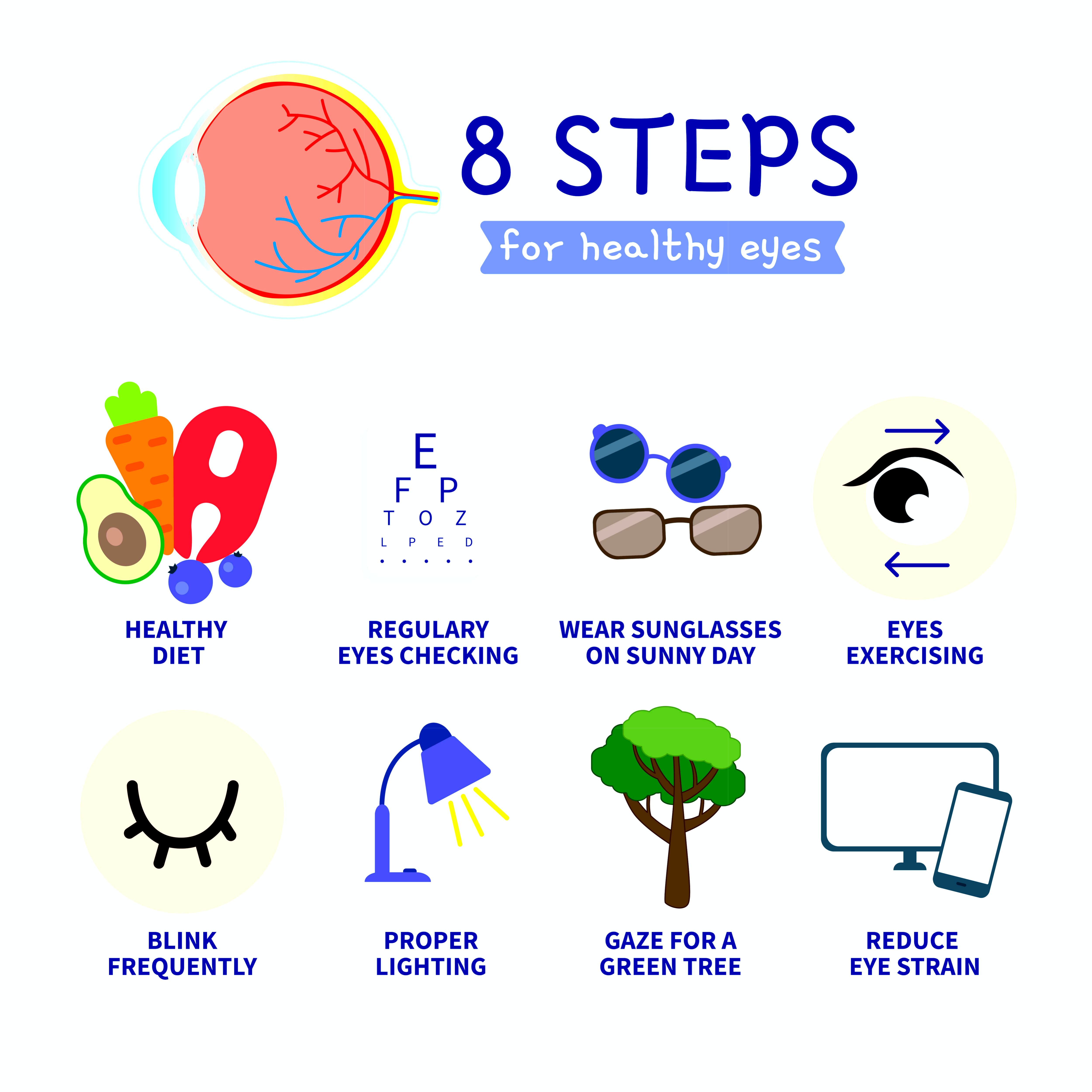All Categories
Featured
Healthy and balanced vision is a cornerstone of lifestyle, yet many people underestimate the relevance of nutrition in keeping eye health and wellness. A diet abundant in particular nutrients can shield your eyes, decrease the risk of establishing common eye conditions, and support total ocular function. Allow's explore just how nutrition effects your eyesight and the crucial nutrients you must include in your daily dishes.
Important Nutrients for Eye Health
Vitamin A. Known for its function in preserving vision, vitamin A is important for keeping a healthy cornea and enabling low-light vision. Deficiency in vitamin A can bring about evening blindness and other significant eye problems. Excellent sources include carrots, wonderful potatoes, and dark leafy environment-friendlies.
Lutein and Zeaxanthin. Found in high concentrations in the retina, these antioxidants shield versus damages brought on by blue light and oxidative anxiety. Consuming foods like spinach, kale, broccoli, and eggs can help keep your eyes healthy and balanced.
Omega-3 Fat. Omega-3s are vital for the health of the retina and can help lower signs and symptoms of completely dry eye syndrome. Consist of fatty fish such as salmon, tuna, and mackerel in your diet plan, or decide for plant-based resources like chia seeds and walnuts.
Vitamin C. A powerful antioxidant, vitamin C sustains the wellness of blood vessels in the eyes and may reduce the threat of cataracts. Foods rich in vitamin C consist of oranges, strawberries, bell peppers, and tomatoes.
Vitamin E. This nutrient secures eye cells from oxidative damages. Integrate almonds, sunflower seeds, and avocados into your dishes to increase vitamin E degrees.
Zinc. Zinc plays a vital duty in delivering vitamin A from the liver to the retina, aiding in the manufacturing of melanin, a safety pigment in the eyes. Foods such as oysters, beef, and fortified cereals are exceptional sources.
![]()
Protecting Against Eye Issues Through Diet
Macular Deterioration: Anti-oxidants like lutein, zeaxanthin, and vitamins C and E can assist slow the development of age-related macular deterioration (AMD)
Cataracts: Adequate consumption of vitamin C and other anti-oxidants might delay the beginning or protect against of cataracts.
![]()
Dry Eyes: Omega-3 fats help improve tear quality and alleviate completely dry eye symptoms.
Diabetic Retinopathy: A diet regimen reduced in polished sugars and rich in entire foods can help manage blood sugar levels, minimizing the threat of this problem in people with diabetic issues.
Practical Nourishment Tips
Expand Your Diet: Include a range of fruits, veggies, lean healthy proteins, and whole grains to guarantee you're obtaining a wide variety of nutrients.
Limitation Processed Foods: Minimize consumption of sugarcoated and undesirable fats, which can add to systemic health issues impacting your eyes.
Remain Hydrated: Proper hydration supports tear manufacturing and avoids eye dryness.
Consider Supplements: If your diet regimen lacks particular nutrients, consult a healthcare supplier regarding taking supplements for much better eye health.
Verdict
![]()
Good nourishment is a crucial element of keeping ideal eye wellness. By integrating nutrient-dense foods into your diet, you can decrease the risk of eye diseases and safeguard your vision for the long term.
Important Nutrients for Eye Health
Vitamin A. Known for its function in preserving vision, vitamin A is important for keeping a healthy cornea and enabling low-light vision. Deficiency in vitamin A can bring about evening blindness and other significant eye problems. Excellent sources include carrots, wonderful potatoes, and dark leafy environment-friendlies.
Lutein and Zeaxanthin. Found in high concentrations in the retina, these antioxidants shield versus damages brought on by blue light and oxidative anxiety. Consuming foods like spinach, kale, broccoli, and eggs can help keep your eyes healthy and balanced.
Omega-3 Fat. Omega-3s are vital for the health of the retina and can help lower signs and symptoms of completely dry eye syndrome. Consist of fatty fish such as salmon, tuna, and mackerel in your diet plan, or decide for plant-based resources like chia seeds and walnuts.
Vitamin C. A powerful antioxidant, vitamin C sustains the wellness of blood vessels in the eyes and may reduce the threat of cataracts. Foods rich in vitamin C consist of oranges, strawberries, bell peppers, and tomatoes.
Vitamin E. This nutrient secures eye cells from oxidative damages. Integrate almonds, sunflower seeds, and avocados into your dishes to increase vitamin E degrees.
Zinc. Zinc plays a vital duty in delivering vitamin A from the liver to the retina, aiding in the manufacturing of melanin, a safety pigment in the eyes. Foods such as oysters, beef, and fortified cereals are exceptional sources.

Protecting Against Eye Issues Through Diet
Macular Deterioration: Anti-oxidants like lutein, zeaxanthin, and vitamins C and E can assist slow the development of age-related macular deterioration (AMD)
Cataracts: Adequate consumption of vitamin C and other anti-oxidants might delay the beginning or protect against of cataracts.

Dry Eyes: Omega-3 fats help improve tear quality and alleviate completely dry eye symptoms.
Diabetic Retinopathy: A diet regimen reduced in polished sugars and rich in entire foods can help manage blood sugar levels, minimizing the threat of this problem in people with diabetic issues.
Practical Nourishment Tips
Expand Your Diet: Include a range of fruits, veggies, lean healthy proteins, and whole grains to guarantee you're obtaining a wide variety of nutrients.
Limitation Processed Foods: Minimize consumption of sugarcoated and undesirable fats, which can add to systemic health issues impacting your eyes.
Remain Hydrated: Proper hydration supports tear manufacturing and avoids eye dryness.
Consider Supplements: If your diet regimen lacks particular nutrients, consult a healthcare supplier regarding taking supplements for much better eye health.
Verdict

Good nourishment is a crucial element of keeping ideal eye wellness. By integrating nutrient-dense foods into your diet, you can decrease the risk of eye diseases and safeguard your vision for the long term.
Latest Posts
Professional Industrial Roofing Solutions in North Platte, Nebraska
Published en
2 min read
Find Brake Repair & More: Complete Auto Care Solutions from Montclare Auto Repair
Published en
1 min read
Explore WyHy Federal Credit Union – Top Benefits for Your Money Goals
Published en
1 min read
More
Latest Posts
Professional Industrial Roofing Solutions in North Platte, Nebraska
Published May 25, 25
2 min read
Find Brake Repair & More: Complete Auto Care Solutions from Montclare Auto Repair
Published May 25, 25
1 min read
Explore WyHy Federal Credit Union – Top Benefits for Your Money Goals
Published May 24, 25
1 min read